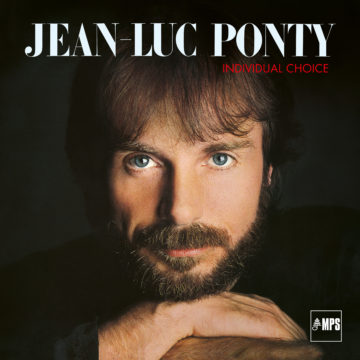Jean-Luc Ponty – Open Mind / No Absolute Time / Individual Choice
MPS is proud to announce the release of three icon albums by French violin legend Jean-Luc Ponty.
The series will start with the release of Open Mind on May 12th, 2023. No Absolute Time will follow on June 9th and Individual Choice on July 21st. The three albums have been re-mastered by 2023 Grammy Nominee Christoph Stickel (cs mastering, Austria) and include new liner notes as well as personal notes by Ponty. The albums will be available on CD (Digipak), 180g black LP, as well as digitally. No Absolute Time will be available as a 2LP, for the first time ever on vinyl.
Born in 1942, the French violinist Jean-Luc Ponty transported jazz violin playing into the world of modern jazz. On Frank Zappa’s urging, Ponty moved to the States in 1970. Over the next years he toured with Zappa, the Mahavishnu Orchestra, and Chick Corea’s “Return to Forever” and became one of the pioneers of jazz-rock and jazz-fusion.
Experimenting with synthesizers in the early 80’s, little did he know that both Individual Choice and Open Mind had a great impact on younger generations of musicians experimenting within the field of electronic music, even 30 to 40 years later. Individual Choice and Open Mind also marked a shift and further development within his compositional work.
No Absolute Time is influenced by the West African rhythms Ponty had used in Tchokola (1991) but this time blended with a more familiar musical style and the electronic music he helped popularize. Collaborating with various African musicians, the album marks a milestone within the crossover of jazz, fusion and world music.
Individual Choice
In the early 1970s Ponty bought himself a sequencer and synthesizer and carried them around while traveling so he could record new ideas. By 1982 Ponty had a well-deserved reputation as a forerunner in jazz-rock and jazz fusion. In a retrospective interview for this re-release of the 1983 album Individual Choice, he said:
“What I was recording in that new sequencer gave me the idea to go for a totally different concept, to use these recordings as rhythmic backgrounds, sometimes without drums or percussion. I planned to record a new album in which I would play all the background parts with my synthesizers and add my violin later on in the studio. I also invited a few guests on different tracks, rather than record yet another band album.”
The guests Ponty invited to contribute to the recording were no other than George Duke (keys), Allan Holdsworth (guitar), Rayford Griffin (drums) and Randy Jackson (bass). Fans of prior albums like Cosmic Messenger and Upon The Wings Of Music may have recognized the music, but it also demonstrated Ponty’s developing style as a composer. At this point in his career, he was as curious about new sounds, and how they shape harmony and melody, as he was to continue to compose in more familiar ways. New Age philosophy was mainstreaming at this time, and the album’s hypnotic moods resonated with new age listeners as well as fusion fans. It helped pioneer techno, and said musically what JLP has been saying before, but more succinct and fresh.
https://MPS.lnk.to/JLP-IndividualChoiceWE

Open Mind
If Ponty’s 1983 album Individual Choice was the sketchbook of his decision to take his music in a new direction, Open Mind (1984), released the following year, was a deeper exploration of the emerging world of synthesizers and sequencers and their impact on live and studio performance. Here, complex rhythmic patterns shift in the background while new sounds appear and disappear on the surface in colorful bursts, and outstanding jazz improvisors create familiar music in new settings. It’s almost an audio version of a kinetic wind sculpture.
Ponty chose to use a Roland rhythm machine instead of faking real drum and percussion sounds and played all the keyboard parts himself in order to further explore the concept he had introduced in Individual Choice. He additionally asked two longtime friends to solo on various tracks: George Benson, whom JLP had met and played with when they were both 21 years old, and Chick Corea, who excels on two tracks with his Moog synthesizer.
“George is for me one of the greatest jazz guitarists in the world,” Ponty said, “and he proves it with his amazingly creative solo on Modern Times Blues.” The same is true for Ponty, who manages to explore the “robotic” while at the same time, on this album in particular, revealing honest emotional beauty in his improvisation and compositions. While it is Chick on the opening track “Open Mind,” and “Watching Birds,” it is Ponty playing piano with confidence and grace on “Solitude.”
https://MPS.lnk.to/JLP-OpenMindWE

No Absolute Time
In 1993, Ponty found the West African rhythms he had used in his project Tchokola so rich, that he decided to use some of them again for No Absolute Time, “[…] but this time meld in my more familiar musical style. I also wrote all the material myself.“ For No Absolute Time, JLP chose to use a mixed band—the same bass player, Guy Nsangué and guitarist Martin Atangana, both from Cameroon, the same percussionist Abdou Mboup from Senegal plus Sydney Thiam from France, and the Moroccan drummer Moktar Samba. Ponty prepared all the background keyboards tracks and went to Paris to record the rhythm section. The rest of the album was recorded in Los Angeles with American keyboardist Wally Minko, and guitarist Kevin Eubanks as a guest on one track.
The electronic experimentation of Open Mind is back, but the music of West Africa is joyously ever present. The album exudes groove and shows Ponty deftly blending the electronic music he helped popularize with a variety of West African rhythms. Which he then improvises over in a clearly recognizable Jean-Luc Ponty style. The compositions are typically graceful, almost cosmopolitan.
https://MPS.lnk.to/JLP-NoAbsoluteTimeWE



